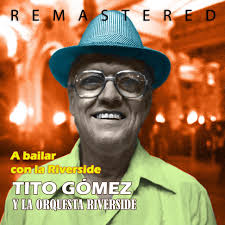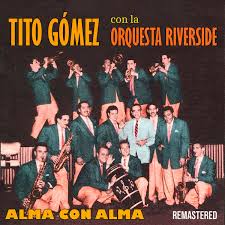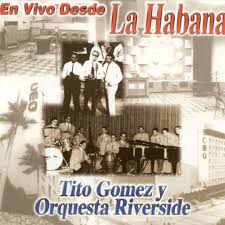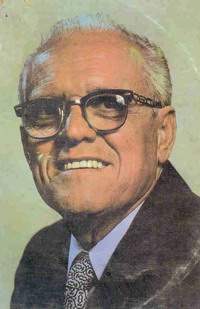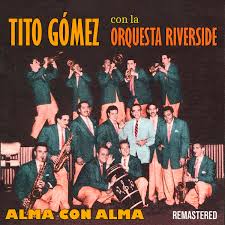Muchos cubanos todavia hoy recuerdan a un popular cantante, Tito Gómez, considerado uno de los mas grandes improvisadores de Cuba y a la Orquesta “Riverside” que le acompañó en sus más populares y mejores éxitos.
La Orquesta Riverside, conocida como Orquesta Havana Riverside entre 1938 y 1941, fue una gran banda cubana de gran éxito que se encontraba entre los conjuntos más populares de las décadas de 1940 y 1950. Fundada en 1938, originalmente fue dirigida por el músico local Enrique González Mantici hasta su muerte en 1945. Otros directores fueron Antonio Sosa (1945–47), Pedro Vila (1947–57), Adolfo Guzmán (1957–62), Argelio González, y Nelson Arocha.
En 1993, el conjunto se disolvió después de un largo período sin éxito. Años más tarde, Raúl Nacianceno Miyares, un antiguo saxofonista de la banda, revivió el nombre de la banda con jóvenes graduados en música, tocando los mismos arreglos que hace 50 años.
CARRERA ARTISTICA DE TITO GÓMEZ
José Antonio Tenreiro Gómez, conocido mundialmente como Tito Gómez, integró orquestas de reconocido prestigio como la Jorrín y la Riverside. Junto a esta última logra su gran éxito al interpretar ‘Vereda Tropical’, canción que le mereció fama a nivel internacional.
Pepe, como era conocido en el seno familiar, nació el 30 de enero de 1920 en La Habana, Cuba. Su padre fue un comerciante español.
Con sólo doce años, José Antonio, ya cantaba en tertulias familiares y círculos de amigos melodías del repertorio lírico, incluyendo las páginas de los maestros Ernesto Lecuona y Rodrigo Prats.
https://youtu.be/DljcYjSZfKA
En 1937, con solo diecisiete años, interpretó de Julio Brito la canción, Cuando te acuerdes de mí y resultó ganador en La Corte Suprema del Arte, popular espacio de la CMQ Radio que tantos talentos descubre y proyecta en esa época.
Con diecinueve años y habiendo terminado el primer año de medicina, le proponen cantar como profesional con la orquesta Sevilla Biltmore, su familia se opone a tal proyecto pero su hermano les hace comprender que debe intentarlo y es así que su padre a pesar de las reservas que tiene accede para convertirse luego en su más fiel fanático.
En 1939, comenzó a cantar profesionalmente con la orquesta Sevilla Biltmore en el Casino Deportivo, pero a solicitud de la dirección del Hotel Nacional, que apreció su interpretación, se trasladan a trabajar allí, donde cantaba plenos boleros, contagiosas guarachas y congas. Con esta orquesta entra por primera vez en un estudio para grabar un disco en que aparecerá identificado ya con el nombre artístico de Tito Gómez.
En 1942, ingresa en la Orquesta Riverside. Comparte dos trabajos, con la Riverside en el cabaret Montmatre y a la vez se mantiene en el Hotel Nacional. Casi enseguida llega la experiencia internacional. Con el permiso del Hotel Nacional y a través de la agencia del propio hotel va a trabajar a uno de la misma cadena en Perú por espacio de seis meses obteniendo considerables resultados, tanto desde el punto de vista artístico como económico.
En la década del cuarenta y con la Orquesta Riverside recorre Puerto Rico, Curazao, Nueva York, Argentina, Brasil, Uruguay y Perú y conquista las simpatías del público en sus presentaciones. Aunque ya era conocido por otros países su popularidad en Cuba comienza a través de las transmisiones de la RHC Cadena Azul de Amado Trinidad, el cual se enamoró de la forma que cantaba Tito e hizo una orquesta para que le acompañara. Era un programa al mediodía, exactamente a las 12:00. Se llamaba El Show de la Radio Cadena Azul. Ya para los años cincuenta sus triunfos se suceden y sus presentaciones en bailes, cabaret, la Radio y la Televisión, se convierten en éxitos del pentagrama inmediatamente.
A mediados de la década del setenta Tito se incorpora a otra gran orquesta, la Jorrín, bajo la dirección de Enrique Jorrín creador del Cha Cha Chá, con la que continúa su gran cadena de éxitos. Entre ellos un tema de Lolita de la Colina Que te vaya bien.
Su interpretación continúo radiándose y televisándose con el mismo éxito y preferencia popular de varias generaciones durante toda su vida.
Se retira con más de 55 años de vida artística pero es reclamado constantemente por las emisoras de radio y televisión hasta su deceso, pues consideran que continúa manteniendo siempre el mismo timbre de voz, la misma sonoridad, brillantez y sobre todo su excelente afinación.
El inmortal intérprete de Vereda Tropical falleció el 15 de octubre del 2000, a los 80 años de edad. El paso del tiempo no menoscabó su voz. Todavía cantaba Vereda… en el mismo registro con que la interpretó por primera vez. Su gran éxito, que grabó en 1950 por vez primera acompañado por la Orquesta Riverside, cuando ya este tema de Gonzalo Curiel le había dado la vuelta al mundo en las voces reconocidas de Toña la Negra, Juan Arvizu y Pedro Vargas. Con él emprende para siempre un ascenso su carrera como cantante.
De visita en México, se encuentra con Pedro Vargas, quién reconoce la superioridad de Tito Gómez en la interpretación de Vereda tropical, sobre las personalidades del canto que como él habían sido opacadas por la voz del cubano que logró popularizarla.
Vereda tropical 1950, autor: Gonzalo Curiel.
Amor, amor, amor, 1952, autor: Gabriel Ruiz.
Alma de mujer, 1955, autor: Armando Valdespí
Cuando ya no me quieras, 1952, autor: Cuates Castilla
Hasta mañana vida mía, 1964, autor: Rosendo Ruiz Jr
¿Y tú que has hecho?, 1950, autor: Eusebio Delfín
Pensamiento, 1950, autor: Rafael Gómez
Distintos senderos, 1959, autor: A. Varona
Clara, 1959, autor: Virgilio González
No es posible querer tanto, 1959, autor: Adolfo Guzmán
Aprende corazón, 1959, autor: Agustín Rodríguez
Frenesí, 1952, autor: Abel Domínguez
Ahora seremos felices, 1959, autor: Rafael Hernández
Bajo un palmar, 1959, autor: Pedro Flores
Alma con alma, 1956, autor: Juan Márquez
Voy a ser feliz, 1974, autor: Jorge Estadella
TITO GÓMEZ AND THE CUBANISIMA “RIVERSIDE” ORCHESTRA. VIDEOS.
Many Cubans still today remember a popular singer, Tito Gómez, considered one of the greatest improvisers in Cuba, and the “Riverside” Orchestra that accompanied him on his most popular and best hits.
The Orquesta Riverside, known as Orquesta Havana Riverside between 1938 and 1941, was a highly successful Cuban big band that was amongst the most popular ensembles of the 1940s and 1950s. Founded in 1938, it was originally directed by local musician Enrique González Mantici until his death in 1945. Other directors were Antonio Sosa (1945–47), Pedro Vila (1947–57), Adolfo Guzmán (1957–62), Argelio González, and Nelson Arocha.
In 1993, the ensemble disbanded after a long period lacking success. Years later, Raúl Nacianceno Miyares, a former saxophonist in the band, revived the name of the band with young music graduates, playing the same arrangements as 50 years ago.
José Antonio Tenreiro Gómez, known worldwide as Tito Gómez, joined renowned orchestras such as Jorrín and Riverside. Along with the latter, he achieved his great success by interpreting ‘Vereda Tropical’, a song that earned him international fame.
Pepe, as he was known in the family, was born on January 30, 1920, in Havana, Cuba. Her father was a Spanish merchant.
At just twelve years old, José Antonio already sang melodies from the lyrical repertoire in family gatherings and circles of friends, including the pages of the teachers Ernesto Lecuona and Rodrigo Prats.
In 1937, when he was only seventeen years old, he performed the song, When you remember me, by Julio Brito and was the winner in The Supreme Court of Art, a popular space on CMQ Radio that so many talents discovered and projected at that time.
With nineteen years old and have finished the first year of medicine, he was proposed to sing as a professional with the Sevilla Biltmore orchestra, his family opposed this project but his brother made them understand that he should try it and so his father, despite the reservations he has access to later become his most loyal fanatic.
In 1939, he began to sing professionally with the Sevilla Biltmore Orchestra at the Casino Deportivo, but at the request of the management of the Hotel Nacional, who appreciated his performance, they moved to work there, where he sang full boleros, contagious guarachas and congas. With this orchestra, he entered a studio for the first time to record an album in which he would already be identified with the stage name of Tito Gómez.
In 1942, he joined the Riverside Orchestra. He shares two jobs, with the Riverside at the Montmartre cabaret and at the same time stays at the Hotel Nacional. Almost immediately the international experience arrives. With the permission of the Hotel Nacional and through the hotel’s own agency, he will work for one of the same chains in Peru for six months, obtaining considerable results, both from an artistic and an economic point of view.
In the 1940s, he toured Puerto Rico, Curaçao, New York, Argentina, Brazil, Uruguay, and Peru with the Riverside Orchestra and won the public’s sympathy in his presentations. Although he was already known by other countries, his popularity in Cuba begins through the broadcasts of the RHC Cadena Azul de Amado Trinidad, which fell in love with the way Tito sang and made an orchestra to accompany him. It was a program at noon, exactly at 12:00. It was called El Show de la Radio Cadena Azul. By the fifties, his triumphs followed and his performances in dances, cabaret, Radio, and Television, became hits of the pentagram immediately.
In the mid-1970s, Tito joined another great orchestra, the Jorrín, under the direction of Enrique Jorrín, creator of the Cha Cha Chá, with whom he continues his great chain of successes. Among them a song from Lolita de la Colina.
His performance continued to be broadcast and televised with the same success and popular preference of several generations throughout his life.
He retires with more than 55 years of artistic life but is constantly claimed by radio and television stations until his death because they consider that he continues to maintain the same timbre of voice, the same sound, brilliance, and above all his excellent tuning.
The immortal interpreter of Vereda Tropical passed away on October 15, 2000, at the age of 80. The passage of time did not impair his voice. Vereda was still singing … in the same register with which he first performed it. His great success, which he recorded in 1950 for the first time accompanied by the Riverside Orchestra, when this song by Gonzalo Curiel had already traveled the world in the recognized voices of Toña la Negra, Juan Arvizu, and Pedro Vargas. With him, he undertakes forever a career as a singer.
Visiting Mexico, he meets Pedro Vargas, who recognizes the superiority of Tito Gómez in the interpretation of Vereda tropical, over the singing personalities who, like him, had been overshadowed by the voice of the Cuban who managed to popularize it.
Agencies/ Wiki/ Ecured/ Internet Photos/ YouTube/ Arnoldo Varona/ www.TheCubanHistory.com
THE CUBAN HISTORY, HOLLYWOOD.



